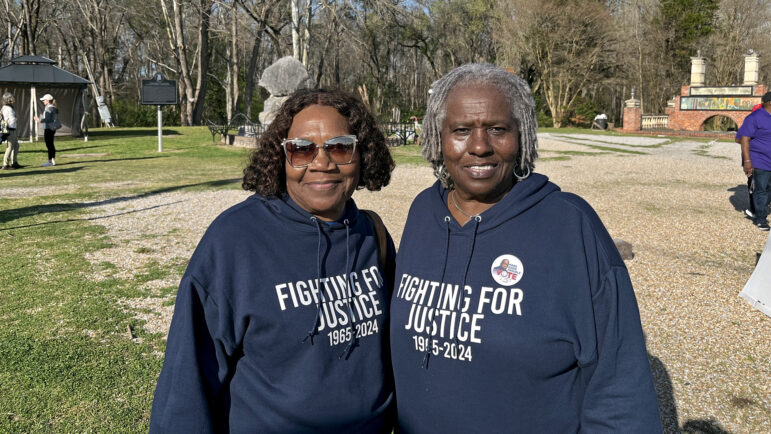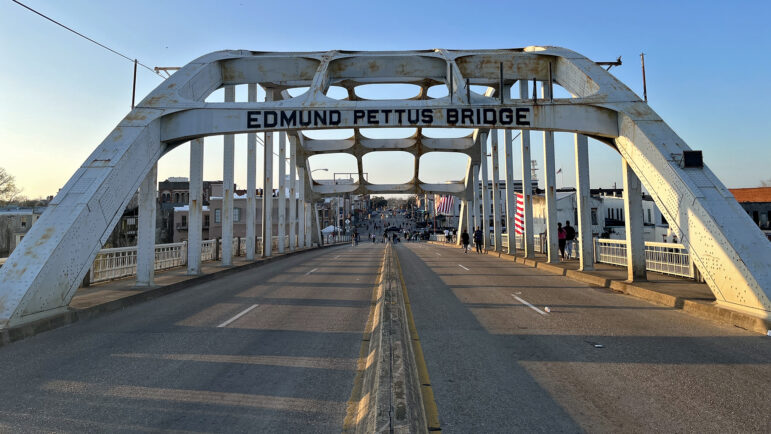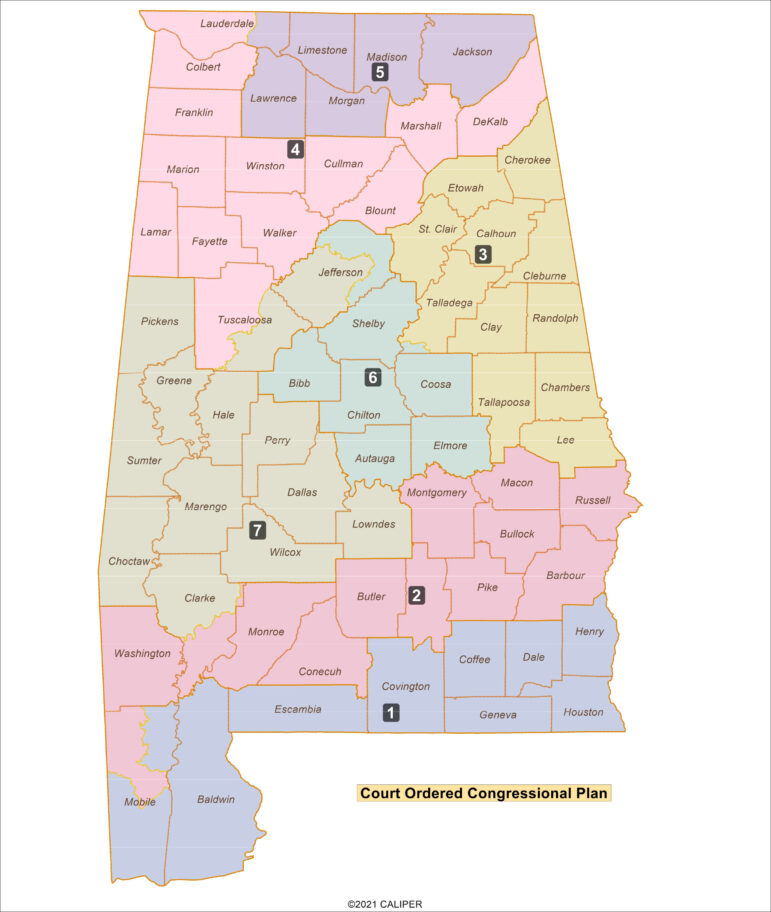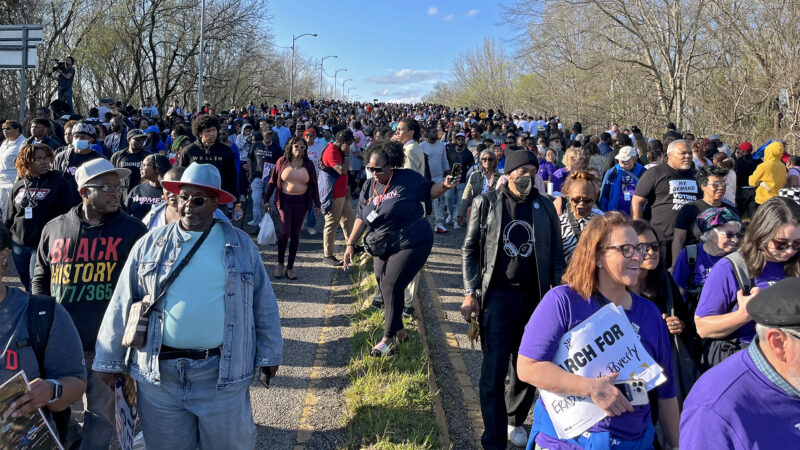Thousands honor Selma Jubilee, voting rights ahead of March 5 election
Thousands of people prepare to walk across the Edmund Pettus Bridge in Selma, Alabama, ahead of the Selma Jubilee March for Voting Rights on March 3, 2024.
The march over the Edmund Pettus Bridge in Selma, Alabama, is a steep one — it’s a tough walk across the Alabama River, enough that for a moment, you can hardly see over to the other side.
That did little to dissuade thousands from walking across it on Sunday when they gathered for the Selma Jubilee Bloody Sunday marches. Demonstrators from all corners of America — Detroit, Atlanta, New York, Seattle and more — attended the event to commemorate the 59th anniversary of Bloody Sunday, when peaceful protestors marching from Selma to Montgomery on March 7, 1965, were met with violent use of force from law enforcement on the Edmund Pettus Bridge
Selma native Alice Moore was a “Foot Soldier” — the name given to people who marched during the protest — that day, walking alongside her sister, Denise Jarnigan-Holt. Moore recalled the burning of the tear gas and being terrified in jail. Their parents didn’t know where they were.

Moore said she finds the incident difficult to talk about to this day, especially with people who don’t understand the contribution that she and her sister made to the movement.
“You walk into a place and other people would say we are not Foot Soldier[s], because we don’t have anything attached to us that says we walked but our heart,” Moore said.
The public’s outrage at the Bloody Sunday incident bolstered the fight for equal rights and ultimately led to the signing of the Voting Rights Act of 1965. The importance of the protestors’ actions remains felt today ahead of the March 5 Primary Election, where voters in the state’s newly-redrawn District 2 will head to the polls for the first time after last year’s Supreme Court ruling.

Previously, the state only had one majority-Black district. Now, there are two after SCOTUS ruled that Alabama’s congressional maps violated the Voting Rights Act. Both districts cover a large portion of Alabama’s Black Belt, and Black voters make up nearly a majority of the new District 2.
Holt and Moore were too young to vote back then, so they marched for their parents’ rights — and now for the rights of voters younger than them. While the new district leaves room for Alabamians to elect a Black representative, it’s not a guarantee. If Black turnout is low, the district could go with a candidate other than the one Black voters want.
“Our parents didn’t have that opportunity to vote until we went through the struggle we went through,” Holt said. “We did that so everybody after them could have that same opportunity to vote.”
How we got the new District 2

The creation of the redrawn District 2 dates back to 1993, when the courts ordered Alabama to reconfigure its 7th Congressional District as a majority-Black district. Black Democrats have held this district since, and the map created is still in use today.
In 2021, state Republicans attempted to draw a new map for redistricting and were quickly sued and accused of their map not being equal for Black voters.
In January 2022, a three-judge panel ruled the state’s congressional district map unlawfully deprived Black voters of an additional House District and likely violated the Voting Rights Act. The next month, in a 5-4 decision, the Supreme Court let Alabama use its old Republican-backed map that the three-judge panel rejected, but Alabama was ordered to redraw the map after that year’s election cycle.
In June 2023, the Supreme Court ordered Alabama to redraw the state’s congressional map, in a 5-4 decision, agreeing with a panel of federal judges that Alabama needed a second congressional district where Black voters had a chance to elect their preferred candidate.
A special session to redraw the map began in July, but state leaders were unable to create a map with the court’s approval, resulting in a special master being appointed to draw new maps for them to choose from.
The current congressional map was chosen on October 5, creating District 2. The District is now 48.7% Black.
This story was produced by the Gulf States Newsroom, a collaboration between Mississippi Public Broadcasting, WBHM in Alabama, WWNO and WRKF in Louisiana and NPR.
A million veterans gave DNA for medical research. Now the data is in limbo
Retired service members donated genetic material to a DNA database to help answer health questions for all Americans. The Trump administration is dragging its heels on agreements to analyze the data.
4 astronauts splashdown on SpaceX capsule to end Axiom Space’s private Ax-4 mission
The private crew included Ax-4 mission commander and former NASA astronaut Peggy Whitson. It was her fifth trip to space and extended her record-setting duration to 695 days, the most of any American.
Heavy rains and flash flooding sweep across Northeast
Flash flood watches and warnings were in place in parts of New Jersey, New York, Pennsylvania and surrounding areas as downpours moved through the region.
Will Congress cut funds to NPR/PBS and foreign aid this week?
The Trump Administration has asked Congress to rescind funds for NPR/PBS and Foreign aid. Congress has until the end of the week to approve the cuts.
Power prices are expected to soar under new tax cut and spending law
In states without policies to drive renewable energy, power prices could surge as federal tax incentives for clean energy disappear, according to Energy Innovation, a think tank.
This family wants to have more babies, but not in a hospital
The Trump administration is encouraging people to have more children, with baby bonuses and tax breaks. But some families who are practicing pronatalism want alternatives to hospital births.








